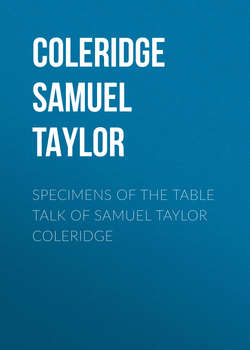Читать книгу Specimens of the Table Talk of Samuel Taylor Coleridge - Coleridge Samuel Taylor - Страница 5
TABLE TALK
January 3. 1823
ОглавлениеMATERIALISM.—GHOSTS
Either we have an immortal soul, or we have not. If we have not, we are beasts; the first and wisest of beasts, it may be; but still true beasts.6 We shall only differ in degree, and not in kind; just as the elephant differs from the slug. But by the concession of all the materialists of all the schools, or almost all, we are not of the same kind as beasts—and this also we say from our own consciousness. Therefore, methinks, it must be the possession of a soul within us that makes the difference.
* * * * *
Read the first chapter of Genesis without prejudice, and you will be convinced at once. After the narrative of the creation of the earth and brute animals, Moses seems to pause, and says:—"And God said, Let us make man in our image, after our likeness." And in the next chapter, he repeats the narrative:—"And the Lord God formed man of the dust of the ground, and breathed into his nostrils the breath of life;" and then he adds these words,—"and man became a living soul." Materialism will never explain those last words.
* * * * *
Define a vulgar ghost with reference to all that is called ghost-like. It is visibility without tangibility; which is also the definition of a shadow. Therefore, a vulgar ghost and a shadow would be the same; because two different things cannot properly have the same definition. A visible substance without susceptibility of impact, I maintain to be an absurdity.
Unless there be an external substance, the bodily eye cannot see it; therefore, in all such cases, that which is supposed to be seen is, in fact, not seen, but is an image of the brain. External objects naturally produce sensation; but here, in truth, sensation produces, as it were, the external object. In certain states of the nerves, however, I do believe that the eye, although not consciously so directed, may, by a slight convulsion, see a portion of the body, as if opposite to it. The part actually seen will by common association seem the whole; and the whole body will then constitute an external object, which explains many stories of persons seeing themselves lying dead. Bishop Berkeley once experienced this. He had the presence of mind to ring the bell, and feel his pulse; keeping his eye still fixed on his own figure right opposite to him. He was in a high fever, and the brain image died away as the door opened. I observed something very like it once at Grasmere; and was so conscious of the cause, that I told a person what I was experiencing, whilst the image still remained.
Of course, if the vulgar ghost be really a shadow, there must be some substance of which it is the shadow. These visible and intangible shadows, without substances to cause them, are absurd.
6
"Try to conceive a man without the ideas of God, eternity, freedom, will, absolute truth; of the good, the true, the beautiful, the infinite. An animal endowed with a memory of appearances and facts might remain. But the man will have vanished, and you have instead a creature more subtle than any beast of the field, but likewise cursed above every beast of the field; upon the belly must it go, and dust must it eat all the days of its life."—Church and State, p. 54. n.
